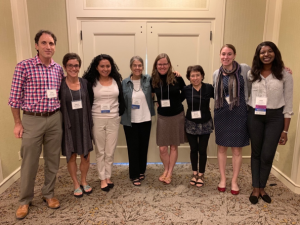
By Claire Turpel Chase
Culminating months of emails and conference calls with some people I knew and several I had never met, all of us strewn across the country, I was moderating a panel on mentoring and career development at the Association for Conflict Resolution 2019 annual conference. We had intentionally created a diverse panel of two late-career professionals, two mid-career professionals, and two early- or even pre-career young professionals. Each journeyed on a different path to their current place in the field and I loved that each embodied the spirit of exploration, no matter what career stage they represented.
Other careers are straightforward, clear, well-practiced: you go to dental school to become a dentist, and once you become a dentist, your answer to that question at cocktail parties is simple.
This field of ours—conflict resolution—is newer and less formalized, leading professionals to chart their own path. Conflict resolution professionals don’t always go to school in this field; just as likely is a combination of cobbled-together higher education and years of practice in another career that lead professionals to say there must be a better way, there must be something else. This choose-your-own-adventure method of career development led me to explore this topic with the six panelists.
Get notified when new articles are posted to the EDR blog – sign up for our email list »
The panel’s two late-career practitioners helped blaze the trail towards making conflict resolution an actual day job, from the days when there were few to no academic programs specifically for conflict resolution and consensus building. The two mid-career panelists had to take risks, say yes when they weren’t sure what they were signing up for, and be willing to knock on doors to ask people how to do this work. That’s inspiring, but also a far cry of difference compared to the step after dental school. And lastly, the two emerging-career panelists highlighted their ability to reach out to strangers, building relationships with more senior mentors in the field. One did so across state lines to someone she never met! The other parlayed her relationships from graduate school in the field to a job in the field, thereby smoothing the path for the next round of young professionals.
I love the field of conflict resolution, but I don’t love that you need a secret handshake to get a job or even to learn what jobs exist. If we keep our field closed off in this way, we will always wonder why we don’t have enough diversity, whether age, race, gender, class, etc. The only way I know how to counteract that is by each of us taking an active role in the career paths of others. This is particularly true for those of us already on the path: look behind yourself to see who is out there whose strengths and interests are needed in our field, and invite them to coffee! Informational interviews should not solely be initiated by students seeking jobs; they can also be initiated by mid- and late-career professionals seeking a fuller, more diverse, richer field.
I learned through moderating this panel that there are so many committed, passionate professionals who want to leave the field better than how they found it, and one of the best ways to do that is to mentor and guide new professionals in the field.

Claire Turpel Chase earned her Masters of Science in Conflict Resolution from the University of Oregon’s School of Law in 2012. From 2011-2018, she practiced at Triangle Associates, Inc. in Seattle, one of the pioneering conflict resolution consulting firms. She facilitated numerous multi-stakeholder, multi-jurisdictional collaborative efforts in natural resources management, focusing on water quality of the Puget Sound, timber practices in the State of Washington, and threatened salmonid species. Switching to the public sector, for the last two years she’s worked for Sound Transit, the greater-Seattle-area transit authority providing light rail, commuter rail, and regional bus service to a three-county area. At Sound Transit, Claire is responsible for the agency’s internal project management oversight program for all capital expansion projects and is building the agency’s enterprise-wide lessons learned program. Claire is the 2017 recipient of the Rob Williams Award for Emerging Leaders from the Association for Conflict Resolution’s Environment and Public Policy Section. She lives in Seattle with her husband in their newly-reconstructed house.
